Deborah J. Ross's Blog, page 152
January 9, 2012
Shouldn't You Be Writing?

... not that I want you go go away and not read my blog. But I don't know any writer (who is online, that is) for whom the internet is not a time sink. The black hole that eats up hours -- days -- of writing. Not to mention leaving us frazzled and dry-eyed. This latter bit is true: when you're staring at a computer screen, you blink less frequently than when you're not, so your eyes get drier. As you age, this effect becomes even more pronounced. So, apart from eye strain (again, more of a problem for older folks), there's that scratchy-eyed feeling as if it's 2 am. This is apart from neck and shoulder strain -- well, you know the ergonomic lament of anyone who sits at a desk all day.
Juliette Wade's blog today is on "the internet as a trap" -- some thoughts on the psychology of how we get locked into online stuff, including what we get out of it -- or think we get out of it -- and some strategies for disconnecting. No, not unplugging. Email, blog sites (like this one!), news sites, social media, are all valuable in their place. So how do we, with our primate brains and addictive natures, manage to keep it all under control?
We can try time management techniques, of course. Check email or compose blog posts only at certain times. Set a timer. (Actually, this is a good idea to remind ourselves to get up and stretch at regular intervals.) Juliette comes up with some strategies I hadn't thought of before, like turning off the sound and expanding the window of our word processors to fill the entire screen so we aren't distracted by "you've got mail" alerts.
Most valuable to me is her insight that "you get out of the internet what you put into it." A version of "quality, not quantity." The shift from passive following of "news" (anything that changes from day to day or minute to minute) to the active creation of content (whether it is a blog post or a comment) can be seen as a writing exercise. If we can stay focused, these things can function as a "warm-up" for our writing day. We can develop internet "places" where we chew over problems, get support for overcoming inertia, trouble-shoot, brainstorm, etc. The trick is to not let these activities expand to fill all available space. A warm-up (or a break) is just that -- and I notice that the scales and exercises I play before my piano practice don't take more than 5 or 10 minutes.
"Becoming ready" to work is an interesting process, different for each of us, I suspect, and changeable over time. For me, the jury is still out as to whether I can use the internet effectively to do this. I'm hoping I can, 'cause I do love hanging out with you guys.
What works for you?
Check out the rest of Juliette's article and her suggestions here
The illo is by Whoee Freek and is in the public domain.

Published on January 09, 2012 10:25
January 6, 2012
Sleepy Mind, Great Ideas... Maybe
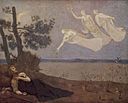
Why is it that juicy story ideas, as well as brilliant solutions to plot problems, pop into my mind when I'm dozing off? All right, that's a rhetorical question. We all know that as we drift into sleep, our brain activity changes. Logic and other constraints on creativity shut down and we make unusual and often wonderful connections between otherwise disparate bits of memory, thoughts, etc. The point of my question is not why this happens, but what to do about the inevitable waking up and being unable to remember.
Catherine Mintz playfully suggests that "it is a law of writing that wonderful things appear as soon as you are too tired to make notes."
Keeping a pen and paper at bedside is a logical remedy. I've done this for a dream journal, which has a slightly different objective, and I've done it for writing ideas at various times over the years. I don't any more, and here's why.
When I read over my notes in the cold, harsh light of day (not to mention an awake brain, with critical faculties online), those "brilliant" ideas fail the brilliancy test. It could be that they are indeed brilliant, but I'm not awake enough to write them down properly. It could also be that the very act of writing them down requires me to shift mental functioning (i.e., to wake up) enough to "lose" the creative connections. It could also be that they are indeed not all that brilliant, they only seem so at the time because I'm too sleepy to have any objective judgment.
I don't think any of these explanations is helpful. Moreover, it's entirely possible that the very act of writing down those sleeptime ideas and then struggling to put them into usable form is counterproductive. Consider daydreams. I believe they are most enjoyable when they have no other purpose than to let our imaginations wander as they will, indulging in whatever interests or pleases us at the moment. I also believe that this is a valuable part of the creative process, at least for writing. Don't know about sculpture or music.
Sleepytime inspirations are much the same -- illogical, bizarre, evanescent, apart from rational critical analysis. This does not mean they are without value. It's important to give our minds (and our creative muses) time to play. Play means we don't expect a utilitarian result. Play is for its own sake. But...
The very process of play, the freedom to do so, feeds into the "simmering soup pot" of ideas, images, connections, from which we draw our stories. Play enriches our inner landscapes, populating them with characters and events that connect with us. So what if we can't remember the next morning? Somewhere, something of value remains, waiting to emerge, perhaps in a totally different form.
I try not to fret about losing that one-and-only perfect solution. I remind myself that nothing creative is ever wasted... or lost. Instead of trying to hold on to a night's musings (muse-ings), I can gently direct my thoughts to a particular story or character or situation, night after night, trusting that if whatever arises in response is good and true, it will come back stronger every time. That makes it more likely to poke its head up when I am awake and focused -- oh yes, I remember you. Then I will have something to work with, using both my sleepytime mind and my rational alert mind in cooperative mode, neither trying to coerce or manage the other.
Sweet dreams!
The image is by French painter Pierre Puvis de Chavannes (1824-1898)

Published on January 06, 2012 11:34
January 2, 2012
Editors Are Your Friends
There's a tendency among newer writers (and -- let's face it -- all of us, at one time or another) to regard editors as adversaries. First of all, acquiring editors are gate-keepers. They're the ones with the power to say No, the ones we have to get past in order to get our books accepted and paid for. They're the ones we think of bribing with chocolate, or placating and cajoling and offering the sekrit handshake to.
Then, once we've cleared that hurdle, we have to face editorial revisions. It isn't enough that we've toiled and toiled and turned ourselves into knots getting a book accepted -- now they want to us to change stuff! To alter our peerless prose! What if they want us to do something that's wrong, wrong, wrong for the book? Where do they get off telling us what to do, anyway?
Madeleine E. Robins made a wonderful comment on this:
My constant refrain, when I'm talking to would-be, wanna-be, and future
writers, is: "editors are your friend. They keep you from going out in
public with your slip showing and pieces of spinach caught in your
teeth. Yes, there are some editors who are, um, overzealous. But most
of them have the best interest of your work at heart, and I doubt there
exists an editor anywhere who gets up in the morning saying "How shall I
screw up great works of prose today?"
What is sad is that twice I have
been informed by someone in the crowd that editors were just wanna-be
writers who were taking out their disappointment on the text before
them.
While many editors are also writers, many are not and never want to be. They love editing, they love "midwifing" wonderful books -- they want to fall in love with yours and make it the best it can be. It is such a joy to work with an insightful, skilled author. Truly, such a professional is an author's best friend.


Then, once we've cleared that hurdle, we have to face editorial revisions. It isn't enough that we've toiled and toiled and turned ourselves into knots getting a book accepted -- now they want to us to change stuff! To alter our peerless prose! What if they want us to do something that's wrong, wrong, wrong for the book? Where do they get off telling us what to do, anyway?
Madeleine E. Robins made a wonderful comment on this:
My constant refrain, when I'm talking to would-be, wanna-be, and future
writers, is: "editors are your friend. They keep you from going out in
public with your slip showing and pieces of spinach caught in your
teeth. Yes, there are some editors who are, um, overzealous. But most
of them have the best interest of your work at heart, and I doubt there
exists an editor anywhere who gets up in the morning saying "How shall I
screw up great works of prose today?"
What is sad is that twice I have
been informed by someone in the crowd that editors were just wanna-be
writers who were taking out their disappointment on the text before
them.
While many editors are also writers, many are not and never want to be. They love editing, they love "midwifing" wonderful books -- they want to fall in love with yours and make it the best it can be. It is such a joy to work with an insightful, skilled author. Truly, such a professional is an author's best friend.

Published on January 02, 2012 11:50
December 30, 2011
Living Now With Cancer
From my dear friend, Bonnie Stockman, as she faces her third recurrence of ovarian cancer, posted with her permission:
I'm going into my third
lap. One is such, ah, a virgin the first time. So hopeful and
optimistic for a cure even with less than charming odds. The second time
is a denouement of sorts, but a thin thread of hope hangs in there - I've talked
to a couple of people that had a recurrence many years ago and are here to tell
about it. The third time... haven't run into anyone that's a long term
survivor after the third time. The stats for treatment effectiveness are
similarly less than cheerful. At this point, one term I saw used was
"salvage chemo". Buys one time - and hopefully salvages some decent
quality of life.
I will miss hearing what happens in all the
stories, but I am reminded that the stories are endless and the beginnings
before my time. I wonder about both ends of them, but all I have is my
part right here in the middle of beginning and ending. It was for others
to know the beginnings and it is for others to know the endings, if indeed there
ever are any endings. Like the saying on the hippie school bus:
"Now is all we have".
Indeed, we have now. And if we have been generous with our hearts, we have each other. Sometimes, we have each other even if we haven't, because life itself is full of gifts. Every day.
Open your eyes. Tell someone you love them. Listen when they love you back.


I'm going into my third
lap. One is such, ah, a virgin the first time. So hopeful and
optimistic for a cure even with less than charming odds. The second time
is a denouement of sorts, but a thin thread of hope hangs in there - I've talked
to a couple of people that had a recurrence many years ago and are here to tell
about it. The third time... haven't run into anyone that's a long term
survivor after the third time. The stats for treatment effectiveness are
similarly less than cheerful. At this point, one term I saw used was
"salvage chemo". Buys one time - and hopefully salvages some decent
quality of life.
I will miss hearing what happens in all the
stories, but I am reminded that the stories are endless and the beginnings
before my time. I wonder about both ends of them, but all I have is my
part right here in the middle of beginning and ending. It was for others
to know the beginnings and it is for others to know the endings, if indeed there
ever are any endings. Like the saying on the hippie school bus:
"Now is all we have".
Indeed, we have now. And if we have been generous with our hearts, we have each other. Sometimes, we have each other even if we haven't, because life itself is full of gifts. Every day.
Open your eyes. Tell someone you love them. Listen when they love you back.

Published on December 30, 2011 17:50
December 28, 2011
Exordium: From Star Wars to Epublishing
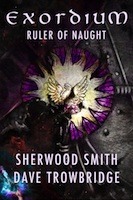
From Sherwood Smith on the Book View Cafe blog:
It's the summer of 1977.
The buzz along our apartment building in Hollywood is that Star Wars is better than it sounds. I'm thinking, gheck. Except for the Salkind Three Musketeers
movie, I loathed seventies films, especially the sf ones: either they
were fight-the-monster movies, or else long, boring screeds in which the
furniture was plastic, and everyone wore these jump suits that looked
like they'd take an hour to get out of if you wanted to pee.
This one (Star WARS? Oh please) sounded like car-crash derby only with space ships.
...
We get out at two a.m. (we'd miraculously gotten into the midnight
showing), passed the enormous line waiting for the next showing, and
Dave grins at me and says "Well?"
"I'm going back."
And we did. We did for about six weeks, every weekend, and then we
said, "We can do that." So we got together one evening (I still have
the notes) and wrote down all the elements that we loved in fiction that
had been missing from movies for years, that Star Wars was tapping into, and we wrote down every extravagant swashbuckling trope we adored and wanted in a story, came up with Exordium , our space opera extravaganza.
I grin every time I hear this story. Dave is my husband, Dave Trowbridge, and today is his debut as a member of Book View Cafe (and the second Exordium book, Ruler of Naught, is now available!)
From Sherwood and Dave on John Scalzi's The Big Idea:
Ruler of Naught is Book Two of our space opera Exordium,
which began life as a mini-series screenplay over twenty years ago,
morphed into a mass-market paperback, and is returning again as an
e-book series.
E-books are not only giving new writers an alternative to traditional
book publishing, but letting oldsters like us resurrect yellowing
paperbacks from used-book crypts. That's a fun process (mostly), but
from Exordium's beginning we've struggled with the skiamorphs
(shadow shapes—like wood grain on plastic) that are left not only when
you move between media, but when your twenty-year-old vision of a
technology's cultural impact collides with present-day reality.

Published on December 28, 2011 09:02
December 27, 2011
The Lesbian Chocolate Sex Scene, or Life With Exordium
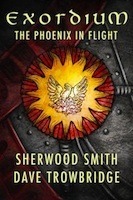
This appeared today on the Book View Cafe blog.
Among the joys of living with a fellow writer (in this case, my
husband, Dave Trowbridge) are the unexpected things that come up during
dinner conversation
"How was your day, dear?"
"Splendid! The lesbian chocolate sex scene works better than ever."
It always was a terrific scene. Even in the original print version of Exordium 2: Ruler of Naught. I wondered what he and Sherwood (Smith, his co-author and co-conspirator) have done to make it better. Ruler of Naught, like the first Exordium volume, The Phoenix in Flight, have been extensively revised for their Book View Café ebook editions.
He goes on, "They've covered themselves in chocolate and are licking
it off one another, and this of course distracts the enemy general
enough to change the course of the entire space battle."
We experience stories in different ways. Some are meant to be told
aloud and fall rather flat when transposed into a fixed medium. The
reverse is true as well, for not all writing reads aloud well, or
transcribes into another medium like film well, which is why the movie
version of a novel is different.

What has any of this to do with lesbians and chocolate (not to
mention alien chastity devices for men and supraluminal battles in
space)? Be patient, my friends.
Some writers like to talk about their works in progress, or
brainstorm ideas and plot snippets. I used to live with an engineer, and
when I'd get stuck on skiffy stuff, we'd go for a long walk and I'd
pick her brains, which mean explaining what I needed the technogeekery
for. This doesn't work for everyone. For some writers, talking about a
work-in-formation or a work-in-progress dissipates the creative passion,
so there's none left for the actual writing.
At last comes the moment when the story is finished, either in
draft-ready-for-critiquing or final published form. Assuming your
friend/spouse/partner actually wants to you to read it, that's a very
different proposition from listening to the fluid amalgam of ideas.
This woman is infuriating, you are muttering. When is she going to get to the part with the chocolate? And the sex? Hold on…
A special delight awaits those of us who get a peek at the process of
revising a finished work. Nothing is truly finished, we know that. At
some point, we just have to turn it in and move on, or the nits and bits
will eat our lives. There are always editorial compromises, and "this
is the best we can do right now"s. We learn by doing, we improve our
writing by practicing it in a thoughtful manner, and our ideas change
and mature as we go, as well. When you put those together with advances
in technology and science, not to mention the growth of the writers, a
work of the length and scope of Exordium practically begs to be revisited.
Okay. The scene. But wait! In order to truly understand it, you have
to know about the furniture that's been ejected into space. Oh, and that
the man looking on (one-eyed, of course) has an… um, "Emasculator"
attached to the… um, masculine part of his anatomy. Not, I point out,
voluntarily.
I read the original print version when Dave and I were courting and
honestly, if I hadn't had such a personal motive, I might not have made
it through the first 150 pages. It's not that I dislike space opera; on
the contrary, I find it great fun, especially when done with wit and
intelligence and bravado, all of which Exordium has in generous
quantities. The opening seemed to be one sequence after another in
which I got introduced to a character, began to care about him or her,
and then the character would get killed. Once I got passed that, I was
hooked both by the sweep and forward movement, the vastness of the
story, but by all the unexpected elements that come out of nowhere and
fit perfectly anyway.
So I was delighted to hear that when Dave and Sherwood decided to offer the Exordium series as ebooks through Book View Café, they rewrote that beginning.
Ah, yes. The chocolate scene. It occurs twice, actually, as if once
were utterly insufficient for chocolate. Once is when it's actually
happening, in part as revenge against the one-eyed man, and once when
the recording is re-played. Did I mention the furniture? That's an
important motivation.
If you, like me, appreciate the role of chocolate as an instrument of
military strategy, an alien race that reveres The Three Stooges, space
battles in which the speed of light plays a crucial role, exiled princes
and galaxy-spanning empires, plots and action, romance and betrayal,
and elegant manners and fart jokes, you'll find much to delight you in
this series.
Oh, the scene? Here's a tidbit, from the middle of the battle:
The main tactical screen jerked and froze. Multiple screens smeared into
unintelligibility. The hyperwave discriminators had finally overloaded.
"Communications!" Juvaszt shouted even as Terresk-jhi stabbed
frantically at her console, and sat back as an image appeared on the
main screen.
Juvaszt's jaw dropped. The entire bridge crew stared.
Anaris blinked, but the image on the main viewscreen was still there.
Incredibly still there: two naked women, one small and spare, one tall
and spectacular, writhed on the deck of a ship in a tangle of limbs,
their tongues following streaks of some viscous dark liquid across each
other's body…
In writing, as well as lovemaking and warfare, timing and placement are everything.
There's more — of course there's more — but you'll have to read the whole book (which you can download here. Which means you really should start with The Phoenix In Flight. Which is on sale, to help you get started. Enjoy!

Published on December 27, 2011 10:15
December 26, 2011
Goals, Wishes, Intentions

I'm not big on resolutions, New Year's or otherwise. More often than not, all they do is set me up to fail, or put me in competition with others, and who needs that? However, I do see a great deal of value in taking some time to clarify where I'm going in my life, if it's where I want to be going, and what I'd like to see different.
Years (as in, decades) ago, a friend suggested making a list of goals instead of resolutions, and to break them down into 1-year, 5-year, 10-year, and lifetime goals. I did that for quite a while, and I still have the notebook I kept them in. It's fascinating to look back at what I thought I wanted, 30 years ago -- what I have achieved, what I no longer want, and what is no longer possible.
Along the way, I realized that some of these things were within my power to achieve, but others were not. I might long for them, but I could not bring them about, or not entirely by my own efforts. For instance, finishing a novel or studying Hebrew are things I can choose to do, but my children being happy, however much I might want to see that come about, is not something I myself can create. These things are wishes, not goals. Of course, many things are both. On my list is to write a work of enduring value -- I can write the best stories that are in me, but how they are received and how they endure the test of time is another matter entirely. I have no say over that.
For 2007, the year I turned 60:
1 year:
Finish (a specific book I was working on)
Transfer family videos to DVD
Celebrate becoming a crone
5 years:
Keep writing good stuff
10 years/lifetime:
Be active and happy
Do something activist and outrageous
As I wrote down goals and wishes, year after year, I found
that they changed in other ways. The specifics tended to be resolved or
discarded, but things emerged that were more general and had more to do
with quality and spirit than measurable achievements. The example I
just gave -- writing something that would speak to people long after I'm
gone as opposed to selling a novel or selling a particular novel
-- shows this change. The farther out in time the goals/wishes, the
less they resembled "resolutions." I've started to think of them as intentions instead.
Yet, the universe does not cooperate with our best intentions. I can wish for and intend to have a year that is one way but get presented with situations and challenges I had no way of anticipating and end up with something quite different, marvelous or heart-breaking. Part of the shift from resolutions to intentions is the introduction of flexibility, of a suppleness of response to whatever life brings. Life is not limited by my imagination (or my fears). It is an adventure, not a fixed syllabus.
Photo by Cleo Sanda

Published on December 26, 2011 10:45
December 22, 2011
And Now A Word From Our E-Publisher...

Both my out of print novels -- Jaydium and Northlight -- are available in electronic form. They're fun reads, if I do say so myself, with adventure and romance and cool nifty stuff. So if you haven't read them, you should hie yourself hence to the appropriate site and indulge yourself.
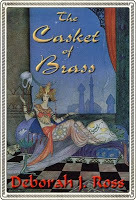 You could zip over to amazon.com...but I'd like to convince you not to. Instead, buy from Book View Cafe. There's no need to give your business to the 800-lb gorilla that seems bent on putting everyone else -- including our favorite indie brick and board bookstores -- out of business. You can download any of BVC's publications to your Kindle (or Nook) (instructions here).
You could zip over to amazon.com...but I'd like to convince you not to. Instead, buy from Book View Cafe. There's no need to give your business to the 800-lb gorilla that seems bent on putting everyone else -- including our favorite indie brick and board bookstores -- out of business. You can download any of BVC's publications to your Kindle (or Nook) (instructions here).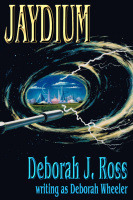
First of all, it's better for the authors. We get a far greater percentage of each sale -- and the cost to you is the same. We decide on how much goes to BVC and none of that end up in the pockets of fatcat investors -- it goes right back into the site so we can pay our tech person decently and other things we decide collectively.
Second, it's much better for you. You purchase a subscription that allows you to download in as many different formats as you like. Once downloaded, the files remain on your devices -- BVC can't "pull the plug," the way they did with Orwell's 1984. If you chuck your Kindle and go for a Nook, you don't have to pay for another download.
Third, you'll find original as well as reprint books by seasoned pro authors, all professionally edited and beautifully formatted (unlike a lot of the ebooks out there!) Some of these are not available anywhere else.
Not sure? You can read sample chapters of all of them to give you a taste.
(After you've downloaded and enjoyed your copies, you could sneak over to amazon.com and leave a short review, of course.)
Here are links to Jaydium , Northlight, Other Doorways - the omnibus that includes both, and the short story, The Casket of Brass. More shorts coming in Spring 2012!

Published on December 22, 2011 16:28
December 18, 2011
A Gift For Your Favorite Author

Michael K. Rose blogged here on 5 Ways to Help Authors Without Spending a Dime. He suggests using Tags and other tools on Amazon.com, as well as Facebook shares and Twitter ReTweets to "boost the signal" for your favorite author's books. I think this is all very well, using the system of referral algorithms ("Readers who liked this book, also liked that other book") to direct potential buyers.
Catherine Mintz, over on Twitter, pointed out that a thoughtful review is even more effective. Depending on where the review gets posted, that can be the equivalent of "word of mouth," which is a good thing. But it leads -- for me, anyway, and I suspect for far too many other readers -- to daunting prospect of actually writing such a review.
Between them, high school book review assignments and professional reviewers had done a disservice to the greater mass of readers (my husband subscribes to the New York Times Review of Books, which always comes to my mind as an example of reviews that look to be as demanding to write as the books themselves!) Although I may appreciate the exercise in comparative literature, historical perspective, and contemporary social values -- these are not the reviews I want to write, or can write with any degree of facility.
For a long time, I felt guilty because I couldn't bring myself to write such detailed and well-researched analyses. That guilt turned into a major obstacle to my writing any review at all. With time and professional confidence, I reached the point of being able to chuck the old expectations. It's not that I lack opinions on what I read, but rather that for the most part, I read subjectively and for my own pleasure. Therefore, my experience of a book is highly colored by the specific environment -- inner and outer -- in which I read it. Here's my second revelation: Personal, subjective reviews are as interesting and valuable as scholarly dissertations.
I think it's valid to talk about books that rescued us from despair, entertained us during illness, comforted us like companions, or transformed our worlds. I love hearing those stories from others. So why shouldn't I tell my own versions -- as reviews? Maybe review is a poor vessel to hold both such idiosyncratic, emotional responses, but it's what we've got.
I'm trying to make a habit of writing a few lines about every book I finish (or fail to finish, and why). Sometimes, I put them up on various review sites, including online bookstores, LibraryThing and Goodreads; other times, they end up in a blog or LiveJournal post. I encourage you to do the same, even if it's just a few lines. You don't have to repeat the plot (that's one part I always hated, although -- paradoxically and capriciously -- I sometimes like that in a review if I want to know more about the book). How did the book strike you? Would you have enjoyed it more at a different time of your life? Did it remind you of other times, other places? How does it stand up to the book before that? Would you read this author's next work? Would you recommend it to a friend and if so, which friend?
And also... would you like to see my own reviews here?
The painting is Young Man Reading by Matthias Stom, 1600-1649. When I look at it, I wonder who he is, what he's reading, and how it is
changing his life. He looks a little sad, so I wonder if it's poetry.
Probably not The Lives of the Saints. What do you think?

Published on December 18, 2011 15:40
December 17, 2011
What We Lose, What We Gain

Wright & Teague Delphi Rings
Some years ago - like maybe a decade - most of my jewelry was stolen. None of it was very valuable, although there were some pearls and jade and a little amber, and a lovely pair of moonstone stud earrings. But, as is the way of things, each piece had a story that was part of my life. That was the real value, and hence the deepest loss. I'd had some of them since my childhood, and some had been gifts from loved ones who've since died. Some of it was my mother's.
I went through the expected rage and frenzy, scouring local flea markets in the forlorn hope that I might spot a piece or two. Of course, I did not. When that stage had run its course, the police report filed (and, doubtless, forgotten), anger turned to grief, and grief to acceptance, and acceptance to looking in a new way at what I'd lost.
I wrote in my journal that the thieves had taken bits of minerals, crystals, shells, fossilized tree sap, but they could not steal:
the stories in my mind
the books I've written
my children
the redwoods
my dreams
my friends
their kindness and generosity to me
my capacity for joy...
Slowly, over the years, I have acquired a new collection. It's smaller and more suited to who I am now. I discovered a few things from my mother, tucked away in an old cigar box with some broken bits and things I didn't wear. Friends and family surprised me with simple, beautiful pieces: a strand of black pearls, an amber pendant, a necklace of silver and garnet dangles, tiny, amazingly delicate garnet earrings. I went through a period of needing "replacements," and then letting them go. My daughter and I have swapped a number of pairs of earrings. It's such a delight to pass them on. And to realize I don't truly need any of this.
What I need are the people I love, and who love me. What I need is to write the stories in my heart. What I need is to work for a better world for everyone.
I look at what I have, what I have lost, what cannot be taken from me, what I have gained. Yes, I enjoy beautiful things. But how much more precious are the memories that come with them.

Published on December 17, 2011 11:04



